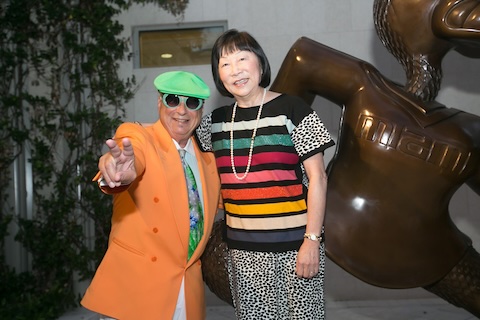Two University of Miami students interested in learning more about China and its impact on the world are the first recipients of a new fellowship to help fund their research on the region.
Skylar Bentlin, a senior triple majoring in political science, religious studies, and Chinese language and culture, along with Nolan Dietz Velarde, a sophomore studying political science and philosophy, are the inaugural awardees of the Ambassador Julia Chang Bloch Fellowship in Asian Studies. The award carries with it a $2,000 stipend to help support research on China and Asia, and to broaden American awareness about the region.
The fellowship, available only to students at the University of Miami and the University of California, Berkeley, was established last year by the F.Y. Chang Foundation on its 35th anniversary, and is generously supported by LIUNA, the Laborers’ International Union of North America, and University alumnus Terence O’Sullivan, its former president.
Ambassador Julia Chang Bloch launched the fellowship when American students studying in China dramatically declined to 350 in 2022, only increasing to about 700 in 2023. An estimated 290,000 students from China are studying in the United States this year.
“Where will America’s future China experts come from?” said Bloch, concerned with the low number of American students studying in China. “In this era of heightened U.S.-China competition, we need to understand our strategic competitor more than ever.”
Bentlin looks forward to using her fellowship to examine China’s alliances and infrastructure plans to evaluate its long-term goals. Her interest in China was inspired by two summers she spent in Taiwan studying Mandarin through the Project GO scholarship. As an ROTC student, Bentlin will commission into the U.S. Army’s intelligence sector after graduation. Following her service, she hopes to work in the Indo-Pacific region.
“This has pushed me to heavily research a topic that I’ve never explored before, so it has helped me gain a lot of interest in China, in terms of their politics,” Bentlin said. “It’s also gotten me more excited about the opportunity of working in Asian affairs in the future, whether it’s in government or the military.”
Dietz Velarde plans to use his fellowship to study how nongovernmental organizations like Greenpeace and the World Wildlife Fund have helped shape successful environmental agreements and policies that have been ratified and enforced by the U.S. and China.
“At an international level, China and the U.S. are contributing to climate change at a rapid rate, so it’s critically important to limit the emissions between these two countries,” said Dietz Velarde. “I feel that this research will be a great step toward mitigating climate change in the future.”

Bloch, the first Asian American to hold the ambassadorial rank as U.S. Ambassador to Nepal, explained: “We are launching these fellowships in the hopes that they will harness the power of education and Asian studies to promote understanding between the U.S. and China so that the world can live in peace.”
Her father, Chang Fu-Yun, received a Boxer Indemnity Scholarship to attend Harvard University in 1911 from his native China. Chang later became the first Boxer Scholar and Chinese student to graduate from Harvard Law School. He then became the first Chinese national to oversee the China Maritime Customs Service, an authority previously controlled by foreign nations. As head of the Tariff Commission, he also negotiated the return of tariff autonomy to China.
The F.Y. Chang Foundation was established by Bloch and her husband, University alumnus Stuart M. Bloch (“StuBloch”), to honor her father’s legacy. The foundation’s largest program, the U.S.-China Education Trust, launched in 1988, promotes constructive relations between the two nations through education and exchange for next generation leaders. The Ambassador Julia Chang Bloch Fellowship is the foundation’s newest program.
“International education brought my family and me to America,” said Bloch. “We want to give back to a country that has been good to us.”
Bloch and her husband have long been strong supporters of the University. As an undergraduate in the 1960s, Stuart Bloch was president of the Student Government and his fraternity, Zeta Beta Tau, and part of the Pep Club. Today, he is a member of the University Alumni Association’s President’s Council. In 1995 the couple established the Distinguished Alumni Lecture Series to recognize the University’s accomplished alumni. In 2023, they made a significant gift that endowed the program.
Erica Arroyo, associate vice president of engagement, is grateful for the impact that the Ambassador Julia Chang Bloch Fellowship will have.
“This is a continuation of the great impact that the Blochs have made on our University beginning in the 1990s,” said Arroyo. “With this new fellowship, I am excited that Stuart and Julia have deepened their commitment to the University by supporting students in their research endeavors.”

